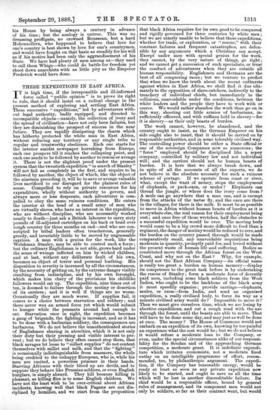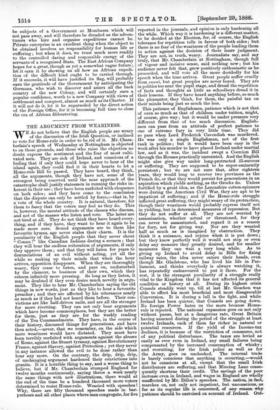THESE EXPEDITIONS IN EAST AFRICA.
IT is high time, if the irresponsible and ill-informed force called " public opinion " is to prove its right to rule, that it should insist on a radical change in the present method of exploring and settling East Africa. These successive " expeditions," led by adventurers with- out legal authority, badly equipped, and directed to incompatible objects—namely, the collection of ivory and the spread. of civilisation—have not only been failuies, but they are diminishing the prospect of success in the near future. They are rapidly dissipating the charm which has hitherto protected the white man in East Africa, without reducing any territory or any single tribe to regular and trustworthy obedience. Each one starts for the interior amidst newspaper hurrahing from Europe, each one prospers till it reaches the collapsing point, and each one needs to be followed by another to rescue or avenge it. There is not the slightest proof under the present system that the twentieth expedition " in search of Stanley " will not fail as completely as the first, and require to be followed by another, the object of which, like the object of the nineteen preceding it, will be to save or avenge valuable lives sacrificed to our disregard for the plainest rules of sense. Compelled to rely on private resources for his expenditure, wholly without authority to govern, and always more or less desperate, each adventurer is com- pelled to obey the same ruinous conditions. He enters the interior at the head of a small army of men who are virtually slaves, who have no interest in the expedition, who are without discipline, who are necessarily worked nearly to death—just ask a British labourer to carry sixty pounds of ill-adjusted cartridges on his back or head over rough country for three months on end—and who are con- scripted by tribal leaders often treacherous, generally greedy, and invariably liable to be moved by unguessable caprices. A man with a genius for the work, like the Welshman Stanley, may be able to control such a force ; but the ordinary Englishman is not able, grows hard under the sense of wrongs inflicted on him by wicked children, and at last, without any deliberate fault of his own, becomes an object of terror and personal loathing. His disposition to severity is increased by all the circumstances, by the necessity of getting on, by the extreme danger visibly resulting from indiscipline, and by his own foresight, which makes him chary of the provisions his childlike followers would eat up. The expedition, nine times out of ten, is doomed to failure through the mutiny or desertion of its carriers ; and it is well if things are no worse. Occasionally they are much worse. If supplies fail, it comes to a choice between starvation and robbery ; and there never was an armed force yet which would submit to hunger while the peasants around had enough to eat. Starvation once in sight, the expedition becomes a gang of brigands, the fighting is incessant, and as it has to be done with a barbarian soldiery, the consequences are barbarous. We do not believe the unauthenticated stories of Englishmen sharing in atrocities, which it is not only their duty but their pressing and visible interest to pre- vent ; but we do believe they often cannot stop them, that black savages let loose to " collect supplies " do not content themselves with millet and milk, and that the " fighting " is occasionally indistinguishable from massacre, the whole being credited to the unhappy European, who is, while his men are excited, a powerless prisoner in their hands. Starving Africans with their blood up are devils, and to suppose they behave like Prussian soldiers, or even English burglars, is simply absurd. They kill because killing is pleasant, as killing flies is to some English children. We have not the least wish to be over-critical about African incidents, knowing well that black Pagans are not dis- ciplined by homilies, and we start from the proposition that black Africa requires for its own good to be conquered and rigidly governed for three centuries by white men ; but we are utterly unable to believe that these expeditions, whether for trade, or exploration, or " rescue," with their constant failures and frequent catastrophes, are defen- sible by any arguments which a Christian can accept. Except under men with special genius for the work, they cannot, by the very nature of things, go right; and we cannot get a succession of such specialists, or trust the conduct of adventurers when they are outside all human responsibility. Englishmen and Germans are the best of all conquering races ; but we venture to predict that when we know the truth about the recent outbursts against whites in East Africa, we shall find it due ulti- mately to the opposition of slave-catchers, indirectly to the treachery of individual chiefs, but immediately to the collisions, unavoidable under the conditions, between the white leaders and the people they have to work with or coerce. We would rather abandon the work than go on in this way, shooting out little armies of barbarians, in- sufficiently officered, and with ruffians held in slavery—for it is slavery—as their only beasts of burden.
The work cannot, however, be abandoned, and the country ought to insist, as the German Emperor on his side ought also to insist, that it should be carried on by responsible authorities, and in some tolerably civilised way. The controlling power should be either a State official or one of the sovereign Companies now so numerous ; the " force " employed should be disciplined like a sepoy company, controlled by military law and not individual will ; and the carriers should not be human beasts of burden. It is here that we always break down, and in spite of all the accounts of all the experts, we do not believe in the absolute necessity for such a ruinous scheme of portage. If we operate from coast or river, what, except the want of money, stops the employment of elephants, or pack-oxen, or mules ? Elephants can thread the jungle, or where does the ivory come from ? A mule can go anywhere that a. man can, and is exempt from the attacks of the tsetse fly, and the oxen are there in the villages, for there is the milk. It must be as possible to move in Africa without human beasts of burden as it is everywhere else, the real reason for their employment being cost; and once free of those wretches, half the obstacles to a successful expedition would be over. The moving body would cease to be a big crowd more difficult to feed than a regiment, the danger of mutiny would be reduced to zero, and the burden on the country passed through would be made comparatively small, any unavoidable requisitions being moderate in quantity, promptly paid for, and levied without the present waste of human life and suffering. Bodies se constituted move through the African forest on the West Coast, and why not on the East ? Why, for example, should not the East African Company—its official name is really too great a burden on human memory—display its competence to the great task before it by undertaking the rescue of Stanley ; form a moderate force of decently paid men, including some black soldiers from the West Indies, who ought to be the backbone of the black army it must speedily organise ; provide carriage—elephants, mules, or oxen—from India, and send an organised expedition, a really civilised body, to force its way as a minute civilised army would do ? Impossible to move it ? Then we must give ourselves time, which we are losing by abortive expeditions, and cut a rough road with the axe through the forest, until the beasts are able to move. That will have to be done some day, and may just as well be done at once. The money ? The House of Commons would not embark on an expedition of its own, knowing by too painful an experience what the cost would be ; but we do not believe it would refuse a moderate loan to the Company, or even, under the special circumstances alike of our responsi- bility for the Soudan and of the approaching German competition, a moderate grant. It is indefinite expendi- ture which irritates economists, not a moderate fixed outlay on an intelligible programme of effort, recom- mended, too, by philanthropic argument. The expedi- tion, if the Company has reasonable energy, would be ready at least as soon as any private expedition now likely to be started, and ought to save us all the time which will be lost in another discreditable failure. Its chief would be a responsible officer, bound by general rules of management, and its component men would not only be soldiers, so far as their contract went, but would be subjects of a Government at Mombassa which will not pass away, and will therefore be dreaded as the adven- turers who hire and organise expeditions cannot be. Private enterprise is an excellent thing when the object to be obtained. involves no responsibility for human life or suffering ; but when it does, we trust much more readily to the controlled daring and responsible energy of the servants of a recognised State. The East African Company hopes for a great, though as yet a somewhat vague future ; let it earn it by showing us all how an African expedi- tion of the difficult kind ought to be carried through. If it succeeds, it will have justified its flag, will probably -earn the gratitude of the Government by anticipating the Germans, who wish to discover and annex all the back country of the new Colony, and will certainly earn a popular confidence, worth to a new Company with views of settlement and conquest, almost as much as its Charter. If it will not do it, let it be superseded by the direct action of the Foreign Office, for it is becoming full time to close the era of African filibustering.







































 Previous page
Previous page